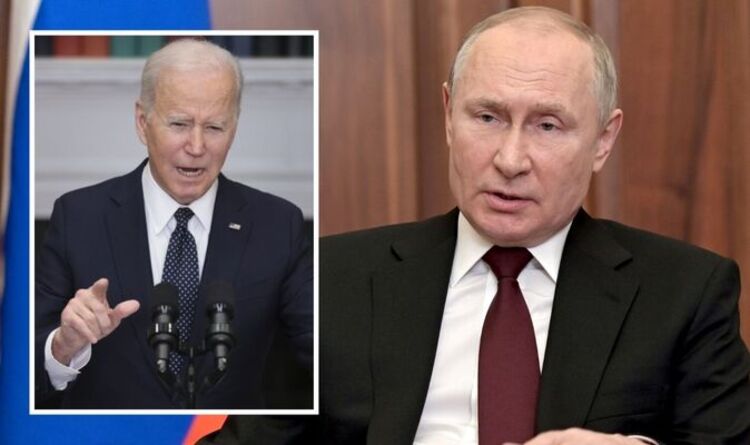Russian invasion 'to take place at any moment' says expert
We use your sign-up to provide content in ways you’ve consented to and to improve our understanding of you. This may include adverts from us and 3rd parties based on our understanding. You can unsubscribe at any time. More info
Putin addressed the Russian nation last night in a televised address, issuing a serious threat to Ukraine in the process. In his address, the Russian President spoke at length about Ukraine’s tied history with Russia, arguing modern Ukraine was wholly and fully created by Russia. He labelled Lenin the “author and creator” of the former Soviet republic. Putin claimed Russia was “robbed” by the collapse of the USSR some 31 years ago, and claimed Ukraine has “never had traditions of its own statehood”.
He also made a direct threat to Ukraine, saying Moscow is “prepared to show you what real de-communisation looks like”.
Putin also signed a decree to recognise the independence of the breakaway regions of Donetsk and Luhansk in eastern Ukraine.
Both areas have been contested by Ukraine and Moscow-backed rebels for many years, with violence ongoing despite a ceasefire agreement.
It is understood that he has now ordered armed forces into the regions on a so-called “peacekeeping mission”.
Dr Paul Flenley, a senior lecturer in politics and international relations, told Express.co.uk that a NATO error in 2008 played a sizable role in the current instability.


He said: “The mistake NATO made was in 2008 at the Bucharest conference, explicitly offering membership to Ukraine and Georgia.
“Had they just left it vague and said it’s open to any democracy to join NATO if they wanted to [they would not have the current situation in Ukraine].
“It’s this explicit promise that has created this dilemma, really.
“Obviously they can’t reverse that now. So Putin isn’t going to get any movement from the West on that one.”
Ukraine and Georgia were both denied membership of the military alliance at the 2008 summit in Bucharest, but then-Secretary General Jaap de Hoop Scheffer promised that they would both eventually become members in time.

Ukraine was once a cornerstone of the Soviet Union, but regained its independence in 1991 following the dissolution of the USSR.
NATO began to push eastward at this point, bringing several former Soviet republics into the fold.
Estonia, Latvia and Lithuania — all formerly in the Communist orbit — were added to NATO in 2004.
Four years later, it declared its intention to offer membership to both Georgia and Ukraine, which ultimately proved the tipping point for Putin.
He considers NATO expansion as a major threat to Russian security. He said yesterday: “If Russia faces such a threat as Ukraine’s admission to the North Atlantic Alliance, to NATO, then the threats to our country will increase many times.”
DON’T MISS:
World War 3 fears were sparked after Russia violated agreement [REVEALED]
Ukraine’s huge nuclear weapons blunder left it exposed: ‘Big mistake’ [INSIGHT]
‘We have crushed the British!’ – Russian ambassador after Brexit vote [QUOTES]

Putin is demanding a legally binding pledge that NATO does not expand any further. He has previously complained that Russia has “nowhere further to retreat to”.
Western leaders have threatened severe economic sanctions on Russia, but Putin does not seem to be deterred by such a threat.
Sascha Glaser, an international security specialist, wrote in DefenseNews in December that the escalation of the situation could have been avoided very easily.
He wrote: “US foreign policy should always serve to increase the security and prosperity of the American people.

“In this instance, the United States also has a responsibility not to lead Ukraine further down the road of no return.”
He continued: “Definitively stating that Ukraine will not be offered NATO membership not only enhances US security by reducing the likelihood of a US-Russia war, it also addresses the root cause of the war in Ukraine.”
The necessity of avoiding an enormously destructive war was echoed by Bruno Macaes, former Portuguese Secretary of State for European Affairs.
Writing in Time magazine last month, he warned: “The existing security order in Europe would be broken beyond repair.
“Europeans would suddenly be living in a world where Russia would have a claim to intervene anywhere in its near abroad or even beyond, any time it felt important interests were at stake.”
He added: “Eurasia, the supercontinent, is being reshaped before our eyes.”
EU leaders confirmed last night that sanctions will be imposed upon Russia after what was described by the bloc’s President Ursula von der Leyen as a “blatant violation of international law”.
It remains unclear, however, to what extent these sanctions will be.
Boris Johnson will chair a COBR meeting this morning to discuss the British response, including agreeing a “significant package of sanctions to be introduced immediately”.
Source: Read Full Article





